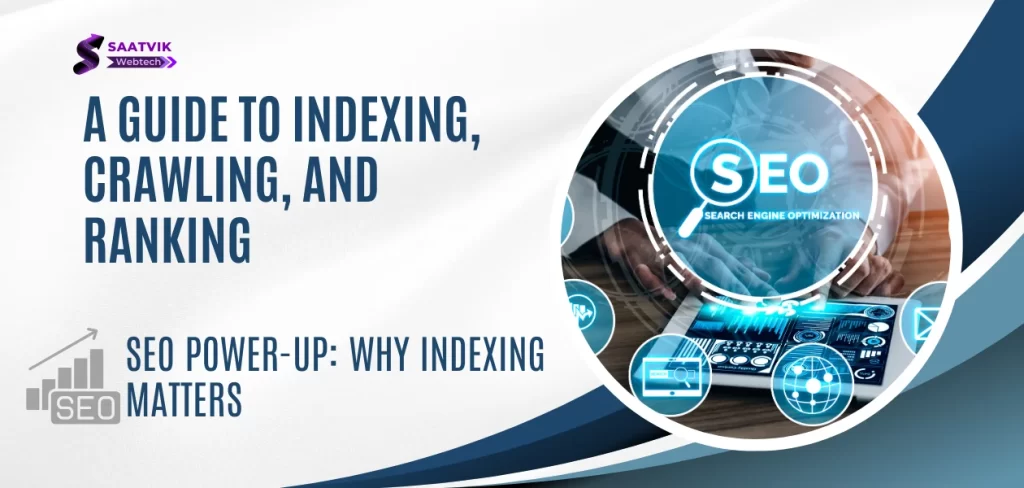The Wait for Results: Why SEO Takes Time
What is indexing in SEO? In today’s crowded online world, seeing results from your SEO efforts can feel like waiting. With so many websites vying for attention, search engines like Google constantly refine their methods to deliver the most helpful results. Let’s break down why patience is key and how to make your website shine in the eyes of search engines.
The Search Engine’s Journey: Crawling, Indexing, and Ranking
Think of search engines as explorers navigating a vast, ever-changing landscape; your website is just one part of that terrain. To understand and rank your content, search engines go through three crucial steps:
- Crawling: Web crawlers (also called bots or spiders) tirelessly scour the internet, following links to discover new pages like yours.
- Indexing: Once found, your page is analyzed and “filed away” in the search engine’s index, a giant database of websites.
- Ranking: When someone searches, complex algorithms sort through the index, determining which indexed pages are most relevant and deserve the top spots in search results.
Why the wait?
SEO takes time because search engines must thoroughly crawl and index your website before it can compete in the rankings. Building trust and authority also requires consistent effort.
Key Takeaway: SEO is an ongoing process, not a magic switch. By understanding how search engines work and making your site easy to crawl and index, you lay the foundation for long-term online success.
What is indexing in SEO?
Imagine your website is a brand-new book in the world’s biggest library. Even if it’s a masterpiece, it will only be found if it’s on the shelves and in the library’s catalog. Search engines like Google are those giant libraries, and indexing is how they catalog your website, making it discoverable.
Indexing in a Nutshell: Indexing is the process search engines use to understand, organize, and store information about web pages. It’s like a librarian reading your website, noting keywords and topics, then filing them away in the right section for people to find.
Why Indexing Matters: If a page isn’t indexed, it’s invisible to search engines. No matter how amazing your website is, it won’t show up in search results if it’s not in the “card catalog” (the search engine’s index).
Questions to Ponder:
Is my website even indexed? How can I check?
What can I do to make sure my most important pages get indexed quickly?
Key Takeaway: Indexing is the foundation of SEO (search engine optimization). It’s what allows your website to be found by potential visitors when they search for information related to your content.
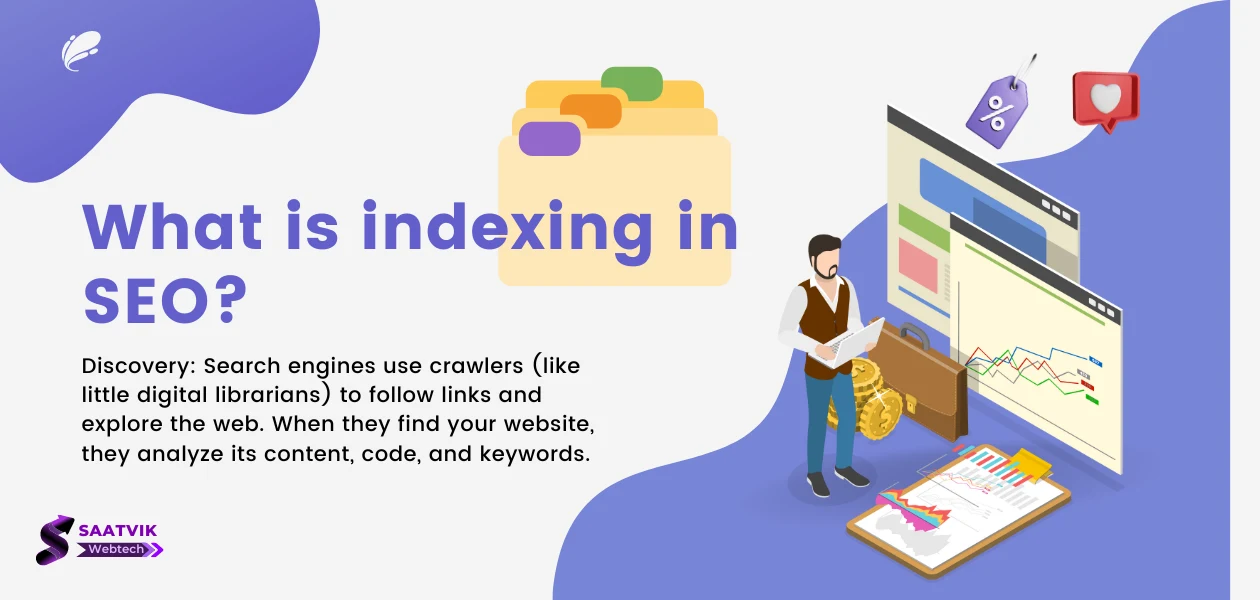 What is indexing in SEO? Your Website’s Key to Search Visibility
What is indexing in SEO? Your Website’s Key to Search Visibility
Picture this: your website is a valuable document hidden in a massive, disorganized library. How would anyone ever find it? That’s where indexing comes in! It’s the process search engines use to organize and catalog websites, making them discoverable when people search for relevant information.
How Indexing Works: A Search Engine’s Filing System
- Discovery: Search engines use crawlers (like little digital librarians) to follow links and explore the web. When they find your website, they analyze its content, code, and keywords.
- Understanding: It’s like the librarian skimming your document, noting important topics and keywords to understand what it’s about.
- Filing: This analyzed information is added to a giant database called the index. Think of it as a meticulously organized catalog of websites.
Why Indexing Matters for SEO
- No Index, No Results: If your website isn’t indexed, search engines can’t include it in search results, even if you have amazing content!
- The Power of Search: When someone types in a search query, the search engine consults its index to find the most relevant indexed pages.
Key Point: Indexing is the first step in getting your website found online. It’s what allows search engines like Google to match your content with what people are looking for.
Why Indexing is Your Website’s Ticket to the Search Engine Spotlight
Imagine you’ve opened the best new restaurant in town, but no one knows it exists. That’s what having a website without being indexed by search engines is like. Indexing is how Google and other search engines add you to their map, making your website discoverable to hungry customers (potential visitors!).
SEO Power-Up: Why Indexing Matters
- Traffic Magnet: An unindexed website is like an invisible storefront. Indexing puts you on the search engine map, helping people looking for what you offer find your website.
- Lead Generation: SEO is proven to generate leads. But first, your website needs to be indexed so it can appear in relevant searches.
- Competitive Edge: In today’s crowded online world, indexing is essential. It’s the first step to competing for top spots in search results and winning more visitors.
How Search Engines Find You
Think of the internet as a gigantic library. To be found on the shelves, your website needs to be:
- Crawled: Search engines send out “bots” to follow links and discover new websites. It’s like librarians exploring the library.
- Indexed: Once found, your website is analyzed and added to the search engine’s index—it’s now officially on the library’s shelves!
- Key Takeaway: Indexing is the crucial first step to unlocking search engine visibility and attracting more visitors to your website.
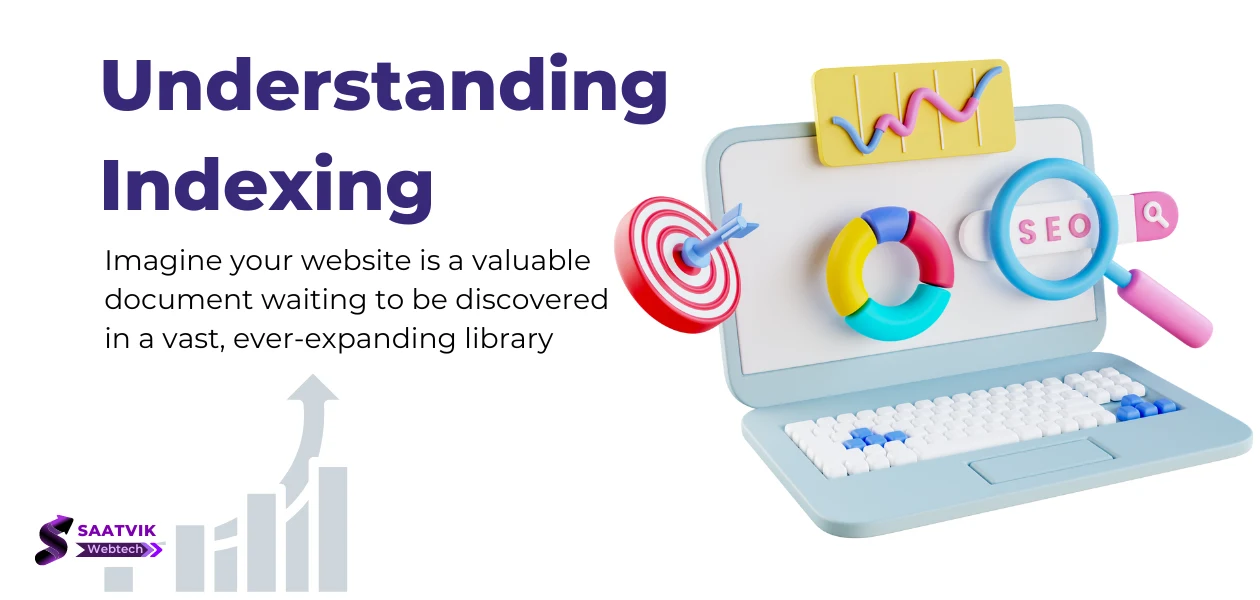 Understanding Indexing: The Search Engine’s Filing System
Understanding Indexing: The Search Engine’s Filing System
Imagine your website is a valuable document waiting to be discovered in a vast, ever-expanding library. Search engines like Google are the librarians, tasked with finding, organizing, and making this information accessible to users. Indexing is the crucial process by which they “catalog” your website, essentially understanding what it’s about and determining its relevance for potential search queries. Think of it as the search engine’s filing system for the billions of web pages out there. Let’s delve into how indexing works and why it matters for your online visibility.
- Think of search engines as giant libraries. Indexing is how they organize their vast collection of web pages.
- When a search engine “indexes” your site, it adds your pages to its database, making them discoverable by users.
- Without indexing, your website is essentially invisible to search engines like Google.
How does website indexing work?
Imagine the internet as a colossal, ever-expanding library, and search engines like Google are the diligent librarians. Website indexing is the process by which these librarians meticulously catalog and organize the library’s vast collection of web pages. They read through your website, analyze the content, and file it away into their index—a massive database of all the websites they’ve discovered. This system lets them quickly find the most relevant pages when someone types in a search query. Indexing is the backbone of search engines and is crucial for getting your website seen online.
- Crawling: Search engines use bots (called crawlers) to follow links and discover new web pages.
- Analysis: Once a crawler finds a page, the search engine analyzes the content, keywords, and structure to understand what the page is about.
- Storing: This analyzed information is stored in the search engine’s index, a massive database.
Indexing and Your SEO Success
Think of search engines as massive libraries, and your website’s pages as individual books. Getting indexed is like getting your book officially added to the library’s catalog. Without indexing, your website might as well be an invisible book on a hidden shelf—no one can find it! Indexing is the gateway to appearing in search results, so ensuring your website is properly indexed is the crucial first step to unlocking your SEO potential.
- Ranking: When someone searches, the search engine uses complex algorithms to match the most relevant indexed pages with the search query.
- No Index, No Ranking: If your pages aren’t indexed, they won’t appear in search results, no matter how great your content is.
How to Get Your Website Indexed
Think of search engines like giant libraries, and your website is a brand-new book waiting to be discovered. Getting your website indexed is like placing that book on the library shelves and adding it to the catalog; it’s how search engines find and understand your content. Let’s explore the key steps to get your website indexed and ready to shine in search results:
- Submit Your Sitemap: A sitemap is like a roadmap for search engines, listing all the important pages on your website. Submit your sitemap directly to the Google Search Console for faster discovery.
- Build Internal Links: Create a clear navigation structure with well-placed links between related pages on your site. This helps search engine crawlers discover and index your content more effectively
- Encourage External Links (Backlinks): When other reputable websites link to yours, it signals to search engines that your content is valuable. Focus on building quality backlinks naturally.
- Use Google Search Console: This free tool is your inside scoop on how Google views your website. Use the “URL Inspection” tool to check the indexing status of individual pages and submit requests for indexing directly.
- Sitemaps: Submit a sitemap to Google Search Console to provide a roadmap of your website’s pages.
- Internal Linking: A well-structured website with clear navigation and internal links helps crawlers find all your important pages.
- Avoid Blocking Crawlers: Ensure your robots.txt file isn’t accidentally preventing search engines from accessing your site
Indexing Checklist
- Submit Your Sitemap: A sitemap lists all the important pages on your website. Submit yours to the Google Search Console for quick discovery.
- Build Internal Links: A clear site structure with internal links between related pages helps search engines discover your content.
- Encourage backlinks: When other reputable websites link to yours, it signals to search engines that your content is valuable.
- Use Google Search Console: Get insights into how Google sees your site. Use the “URL Inspection” tool to check indexing status and submit indexing requests.
- Remember, indexing takes time, especially for new websites. Keep creating great content, address technical issues on your website, and your online visibility will grow!
Remember, indexing takes time, especially for new websites. Keep creating great content, address technical issues on your website, and your online visibility will grow!
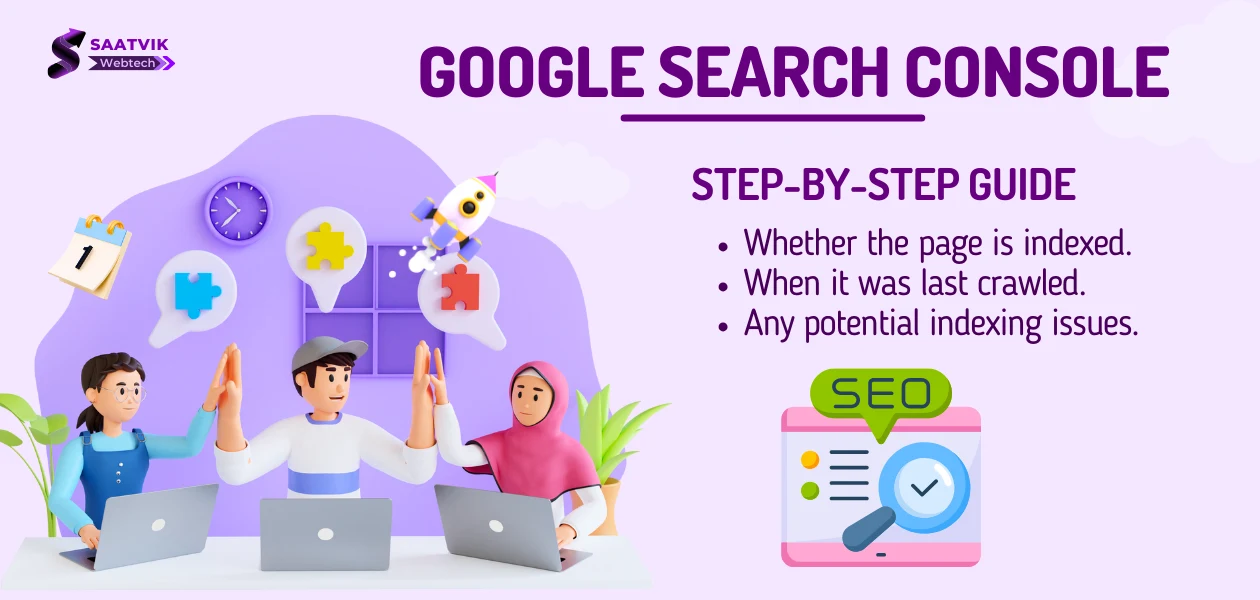 Understanding Indexing with Google Search Console
Understanding Indexing with Google Search Console
Google Search Console (GSC) is a powerful free tool that helps you monitor and understand how Google sees your website. It provides invaluable insights into your site’s indexing status and offers ways to actively request indexing for new or updated content.
Step-by-Step Guide
Set up the Google Search Console:
- If you haven’t already, create a Google account (if you don’t have one).
- Visit the Google Search Console website: https://search.google.com/search-console/about
- Click “Start Now” and follow the instructions to add and verify ownership of your website.
Use the URL Inspection Tool
- Once your website is verified in GSC, navigate to the “URL Inspection” tool in the left-side menu.
- In the search bar at the top, paste the full URL of the page you want to inspect.
- Google will display the current indexing status of the page and provide insights into:
- Whether the page is indexed.
- When it was last crawled.
- Any potential indexing issues.
Request Indexing (If Necessary)
- If the page is not indexed, or if you’ve made significant updates, click the “REQUEST INDEXING” button. This sends a signal to Google to recrawl and reevaluate the page.
- Note: Indexing isn’t guaranteed, but this speeds up the process.
Submit an XML Sitemap
- A sitemap lists all important pages on your website.
- In GSC, go to the “Sitemaps” section in the left-side menu.
- Enter your sitemap URL and click “Submit.”. This helps Google discover new pages and updates efficiently.
Additional Tips
- Monitor Indexing Coverage: Under the “Index” section of GSC, you’ll find the “Coverage” report. This gives you a broader overview of how many of your pages are indexed, along with any errors or warnings.
- Check Mobile Usability: The “Mobile Usability” report in GSC indicates any issues that might hinder indexing on mobile devices.
- Patience is key. Indexing can take time, especially for new websites or pages. Keep producing high-quality content and address any technical errors to improve your chances over time.
Decoding Google Indexing: Your Key to Search Visibility
Ever wondered how your website actually shows up in Google searches? That’s where Google indexing comes in. Think of it as Google adding your website to its massive digital library. Without indexing, your site is practically invisible to searchers.
So, what is the Google Index?
Picture a gigantic library catalog listing every book it holds. Now, replace “books” with “websites,” and you’ve got the Google index! It’s a vast database where Google stores the web pages it finds.
How does Google find & index your pages?
- Crawling: Google sends out tiny programs called web crawlers. These crawlers tirelessly hop from link to link, discovering new pages (like yours!).
- Understanding: Once a crawler finds your page, Google analyzes the text, images, and code to figure out what your page is all about.
- “Filing” it away: This analyzed information then gets added to the Google index, ready to be matched with relevant search queries.
Index or No Index: You Have Some Control
Meta tags let you tell Google whether to index a page or not. A “no-index” tag means “don’t add this to your library catalog.” Smart SEO often involves choosing what to index and what to keep hidden to give your most important content the best chance.
The Importance of Organic Traffic
Organic traffic (visitors coming from search engines) is crucial for online success. No indexing means no traffic from Google!
Unlocking Search Engine Visibility: What is Indexing?
Imagine that your website is a hidden gem waiting to be discovered. Indexing is how search engines like Google find that gem and showcase it to the world. Let’s break down what indexing is and why it’s crucial for your website’s success.
Indexing: Your Website’s Key to the Search Engine Library
Think of search engines as massive libraries, with each webpage representing a book. Indexing is the process of cataloging these books, analyzing their content, and organizing them on the shelves. This allows search engines to quickly match user searches with the most relevant pages.
Why Indexing Matters
- No Index, No Traffic: If your pages aren’t indexed, it’s like your book is stuck in a forgotten corner of the library. No matter how valuable your content is, it won’t appear in search results.
- Indexing = Discoverability: Indexing gives your website the chance to shine in search engine results pages (SERPs), attracting the right visitors who are searching for what you offer.
How to Get Your Pages Indexed
- Cater to Search Engines: Make sure your website is well-structured, easy to navigate, and uses keywords relevant to your content.
- Backlinks Boost: Links from other reputable websites act like recommendations, signaling to search engines that your content is valuable.
- Don’t Block Search Engines: Check that you’re not accidentally hiding pages from search engines with technical settings like your robots.txt file.
- Request Indexing: Tools like Google Search Console allow you to directly request indexing for new or updated pages.
Key Takeaway: Indexing is the first step towards getting your website the attention it deserves. By understanding how it works and taking proactive steps, you can improve your chances of being found by your ideal audience.
What’s a search index? Your Shortcut to Finding the Right Web Pages
Ever wish you could instantly find the perfect page on a website, like flipping to the right section of a book? That’s what a search index does! It’s the behind-the-scenes system that makes those website search boxes so helpful.
Think of it Like Your Book’s Index
Remember those handy indexes at the back of big textbooks? They list keywords and page numbers where you can find information about them. A search index works the same way, but for websites:
- Search engines build the index. Instead of a person creating it, search engines like Google use programs called crawlers to scan websites and make a giant list of keywords and where they appear.
- You type, the index finds: When you type something into a website’s search bar, the index works lightning-fast to match your search with relevant pages.
Why It Matters:
- Time saver: No more clicking through endless menus to find what you need.
- Better results: Search indexes use more than just keywords; they understand the meaning behind your search to give you the most helpful pages.
Key Takeaway: Search indexes make websites way more user-friendly. They’re the little helpers that turn a massive jumble of web pages into a neatly organized resource!
Search Engines: Behind the Scenes of Your Website’s Visibility
Have you ever wondered how search engines know what your website is about and when to show it in search results? The answer lies in two crucial processes: crawling and indexing. Let’s unravel these mysteries!
Crawling: The Web Explorer
Imagine a tireless scout following a map of links to discover new territories. That’s essentially what web crawlers (sometimes called bots or spiders) do. They start with known websites and follow links, hopping from page to page, tirelessly exploring the vastness of the internet.
Indexing: The Librarian’s Filing System
Think of indexing as organizing a giant library. Once a crawler lands on your page, it’s like a librarian analyzing the content, keywords, and structure to understand what your page is about. This information is then carefully stored in the search engine’s index, a massive database of discovered websites.
The Key Difference
- Crawling is the discovery process—finding new and updated pages.
- Indexing is the organization process—making sense of the discovered content and adding it to the searchable catalog.
Why This Matters for Your SEO
If your pages aren’t crawled, they can’t be indexed. And if they aren’t indexed, they won’t show up in search results! By understanding how crawlers and indexing work, you can make your website easier for search engines to navigate and understand.
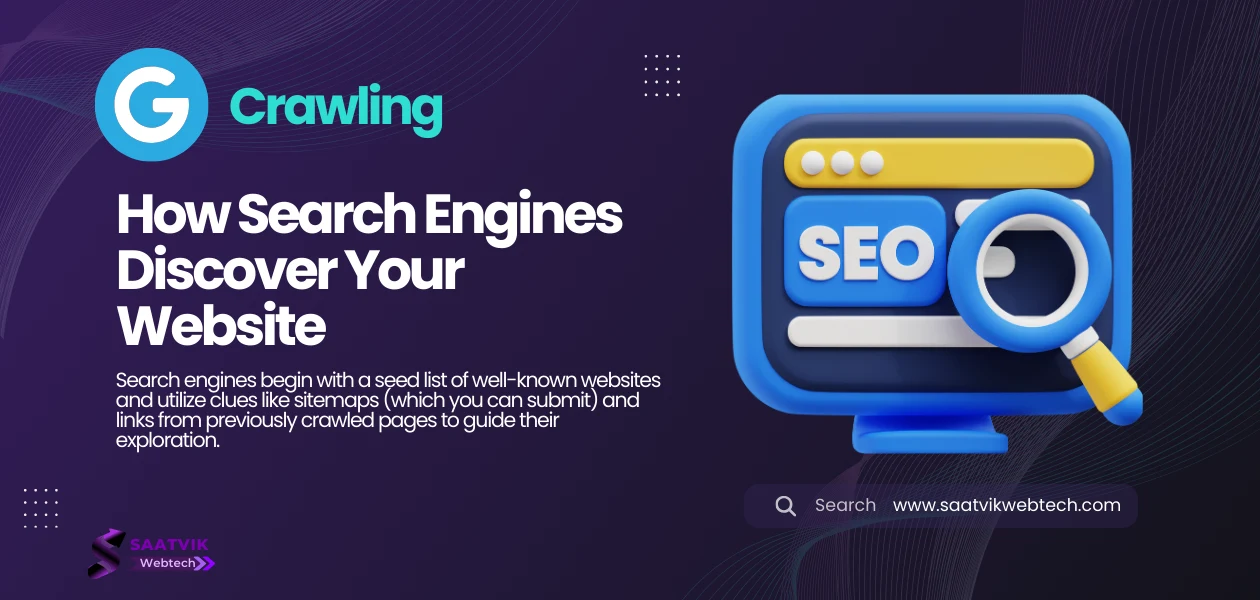 Crawling: How Search Engines Discover Your Website
Crawling: How Search Engines Discover Your Website
Imagine search engines as intrepid explorers, and your website is a hidden treasure waiting to be found. Crawling is the process these explorers use to systematically uncover your online presence. Let’s break down the details:
The Web Crawler’s Mission: Web crawlers, also known as bots or spiders, are automated programs tirelessly scouring the internet. Their primary goal is to follow links from page to page, discovering both new content and updates to existing pages.
Starting Points: Search engines begin with a seed list of well-known websites and utilize clues like sitemaps (which you can submit) and links from previously crawled pages to guide their exploration.
Prioritizing the Crawl: Search engines want to find the most valuable content efficiently. Here’s what impacts how often your site is crawled:
- Popularity: Well-linked websites get more attention.
- Quality: High-quality, informative content earns favor.
- Freshness: Sites with regular updates are crawled more frequently.
- Crawl Budget: This refers to the number of pages a search engine will crawl on your site within a given time. Factors like website size, health, and update frequency influence your budget.
How to Optimize for Crawling
- Clear Navigation: Make sure your website has a well-structured hierarchy and internal links, aiding crawlers in discovering all your important pages.
- Avoid Blocking: Ensure your robots.txt file isn’t accidentally preventing search engines from accessing valuable sections of your website.
- XML Sitemaps: Submit a sitemap to Google Search Console and other search engines. This provides a direct roadmap of your website’s pages.
- Technical Health: Address issues like broken links, slow loading times, and duplicate content, which can hinder the crawling process.
Key Takeaway: Crawling is the first step towards search engine visibility. By making your website crawler-friendly, you increase the chances of your content being discovered and indexed, paving the way for potential success in search results.
Are you ready to take control of your website’s visibility in search engine results?
Understanding the fundamentals of indexing and crawling is the first step towards unlocking your SEO potential. By ensuring your website is properly indexed, you’ll lay a strong foundation for attracting more visitors and achieving your online goals.
Key Takeaways to Boost Your Search Engine Success:
- Indexing is essential. Without it, your website is practically invisible to search engines, no matter how great your content is.
- Proactive measures matter: submit sitemaps, optimize your website’s structure, and use tools like Google Search Console to actively improve your indexing.
- Patience is key. Indexing and ranking take time, but consistent effort and a focus on quality will pay off in the long run.
Want a deeper dive into SEO strategies or need help assessing your website’s indexing?
FAQ: Understanding Indexing and Your Website’s Visibility
Q: What is indexing in SEO, and why is it so important?
Indexing is the process by which search engines like Google understand and catalog your website. Think of it like a giant library: indexing is how your website gets added to the shelves and the card catalog. Without indexing in SEO, your website is essentially invisible, even if you have top-notch content.
Q: How does the indexing process work in SEO?
A: Here’s how indexing in SEO works:
Crawling: Search engines send out “bots” called crawlers to follow links and discover new web pages.
Analysis: Once a crawler finds your page, the search engine analyzes its content, code, and keywords to understand what it’s about.
Storage: This information is stored in the search engine’s index, a massive database of websites.
Q: Can I check if my website is indexed?
A: Absolutely! The easiest way is to use a “site” search on Google. Type “site: [invalid URL removed]” into Google’s search bar. If pages from your website appear, they’re indexed. You can also use tools like Google Search Console for more detailed insights into your indexing in SEO.
Q: How can I improve my website’s indexing in SEO?
A: Here are some key tips:
Submit a sitemap. This gives search engines a roadmap of your website’s pages.
Encourage backlinks: Links from other reputable websites signal to search engines that your content is valuable.
Use clear navigation. A well-structured website with internal links helps crawlers find all your important content.
Q: Does indexing in SEO guarantee my website will rank highly?
Indexing is the first step, but it doesn’t guarantee top rankings. SEO involves many factors, including content quality, relevance, and user experience. Indexing lays the foundation for search engines to find and evaluate your website.
